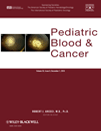Inhibition of Bcl-2 and Bcl-X enhances chemotherapy sensitivity in hepatoblastoma cells†
Conflict of interest: Nothing to report.
Abstract
Background
An increased expression of anti-apoptotic proteins is regularly found in malignant cells, contributing to their clonal expansion by conferring an improved survival ability. In Hepatoblastoma (HB) apoptosis regulation contributes to resistance and therapy failure, therefore we modulated apoptosis sensitivity of HB cells for an improved cytotoxic activity of commonly used drugs.
Procedure
Apoptosis-related proteins were quantified in HB cells (HuH6 and HepT1) using protein assays. Interaction of ABT-737, a small-molecule inhibitor of Bcl-2, Bcl-xL, and Bcl-W with cytotoxic drugs was monitored in a proliferation assay. Apoptosis induction was measured by caspase-3 activity.
Results
We found high levels of the anti-apoptotic protein Bcl-2 and Bcl-X as well as low levels of pro-apoptotic protein Bax and Bad in both HB cell lines. ABT-737 induced apoptosis in HuH6 and HepT1 cells at concentrations higher than 1 µM. ABT-737 also enhanced the cytotoxic effect of cisplatin (CDDP), doxorubicin (DOXO), etoposide and paclitaxel when used as combination therapy. HuH6 expressed slightly higher pro-apoptotic and lower anti-apoptotic protein levels than HepT1, which may explain the stronger enhancement of cytostatic drug effects in HuH6 cells when treated in combination with ABT-737.
Conclusion
The observed anti-apoptotic phenotype in HB cell lines may contribute to resistance to cytotoxic drugs used in the standard treatment protocol of HB. These pre-clinical results suggest that apoptosis sensitizers with BH-3 mimicry, such as ABT-737, should be further evaluated in preclinical models of HB. Pediatr Blood Cancer. 2010;55:1089–1095. © 2010 Wiley-Liss, Inc.




